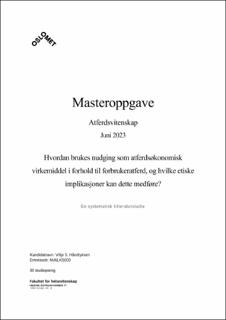| dc.description.abstract | Nudging defineres som en måte å organisere valgmuligheter på for å endre forbrukeres atferd på en forutsigbar måte, uten å forby andre valg og signifikant endre de økonomiske insentivene. Men hvordan anvendes nudging som atferdsøkonomisk virkemiddel i forhold til forbrukeratferd? Og hvilke etiske implikasjoner kan bruken av slike metoder medføre? Norge er et av de landene i Europa med flest dagligvarebutikker per innbygger. Grunnet dette havet av valgmuligheter og vår begrensede rasjonalitet, trenger vi å bli «dultet» i riktig retning for å ta valg som er økonomiske, miljøvennlige og helsemessig kloke, og som er til nytte for både oss selv og samfunnet. Denne studien er en systematisk litteraturstudie som har som mål å undersøke hvordan nudging brukes som atferdsøkonomisk virkemiddel i forhold til forbrukeratferd, spesielt i dagligvaresektoren, i tillegg til å vurdere de etiske problemstillingene knyttet opp mot dette. Det er til sammen 20 fagfellevurderte artikler som utgjør grunnlaget for funnene i resultatdelen som er todelt, og som tar for seg effekten av nudging i forbrukersettinger og hvilke etiske betraktninger som gjør seg gjeldene. Nudging som atferdsøkonomisk virkemiddel viser seg, alt i alt, å ha en positiv men varierende effekt i forbrukersettinger, spesielt gjelder dette for bærekraftige og helsefremmende dagligvarer. Det finnes etiske argumenter mot bruk av nudging, men de viser seg ikke å være tungtveiende nok til at metoden ikke burde anvendes i forbrukersammenhenger. Videre forskning på temaet om etiske implikasjoner knyttet nudging som atferdsøkonomisk virkemiddel vil forhåpentligvis gi nye funn som bidrar til å økt kunnskap rundt dette temaet.
Nudging is defined as a method for organizing alternatives in order to predictably change consumers choices, without significantly changing the economic incentives. But how can we use nudging as a behavioral economic tool in the field of consumer behavior? And what ethical implications can the use of such methods entail? Norway is one of the countries in Europe with the most grocery stores per capita. Due to the sea of choices and our limited rationality, we all need to be “nudged” in the right direction to make choices that are economical, environmentally friendly and health promoting, to benefit both ourselves and the society. This study is a systematic literature review, which aims to investigate how nudging is used as a behavioral economic tool in relation to consumer behavior, especially in the grocery retail industry. Furthermore, it aims to assess the ethical issues linked to this. A total of 20 peer-reviewed articles forms the basis of the findings in the result section, dealing with the effects of nudging in consumer settings and the ethical considerations that apply. All in all, nudging proves to have a positive but varying effect in consumer settings. This particularly applies to sustainable and health-promoting groceries. There are ethical arguments against the use of nudging, but they do not prove to be weighty enough for the method not to be used in consumer contexts. Further research on the topic of ethical implications related to nudging as a behavioral economic tool, will hopefully yield new findings, which are likely to contribute to increasing knowledge around the topic. | en_US |
